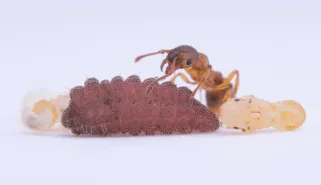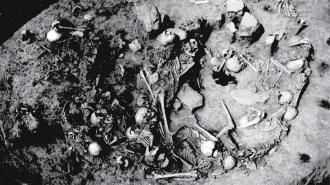News
-
 Animals
AnimalsKeeping a beat wins caterpillars friends in low places
Finding a caterpillar with rhythm was “mind-blowing,” suggesting it might be a more widespread part of animal communication than thought.
By Jake Buehler -
 Life
LifeAn African monkey ate a rope squirrel and came down with mpox
Fecal analyses and necropsies suggest a fire-footed rope squirrel was the source of a 2023 mpox outbreak among sooty mangabeys in Côte d’Ivoire.
-
 Health & Medicine
Health & MedicineA lab on wheels is tracking HIV spread in war-torn Ukraine
During a test drive, the mobile lab van uncovered a drug-resistant HIV strain that sprung up after the ongoing war with Russia started.
By Kamal Nahas -
 Planetary Science
Planetary ScienceVenus has a massive lava tube
A collapsed lava tube detected in 30-year-old radar data from Venus may be part of a much wider network of underground caves.
By Tom Metcalfe -
 Archaeology
ArchaeologyIron Age mass grave may hold unusual victims: mostly women and children
A land dispute may have led to the massacre 3,000 years ago, suggesting Europe’s transition to farming wasn’t always peaceful.
By Tom Metcalfe -
 Genetics
GeneticsWanderlust may be written in our DNA
A new study suggests that inherited traits explain a small but measurable share of why some people relocate far from where they were born.
By Elie Dolgin -
 Health & Medicine
Health & MedicineThis itch-triggering protein also sends signals to stop scratching
The TRPV4 protein’s dual nature, found in studies with mice, may complicate the hunt for human itch treatments
-
 Health & Medicine
Health & MedicineMeds like Ozempic could ease arthritis
A study in mice and people with osteoarthritis suggests semaglutide can bulk up cartilage between bones, though bigger trials are needed to confirm.
By Meghan Rosen -
 Climate
ClimateHalting irreversible changes to Antarctica depends on choices made today
Antarctic Peninsula projections show accelerating ice loss, warming oceans and global sea level impacts tied to greenhouse gas emissions.
-
 Chemistry
ChemistryMachine learning streamlines the complexities of making better proteins
The framework predicts how proteins will function with several interacting mutations and finds combinations that work well together.
By Skyler Ware -
 Climate
ClimateSnowball Earth might have had a dynamic climate and open seas
Sediments from Scotland hint that ocean-atmosphere interactions continued more than 600 million years ago despite widespread ice.
-
 Paleontology
PaleontologyA mouth built for efficiency may have helped the earliest bird fly
A flexible tongue, sensitive beak and teethlike cones in the mouth may have helped Archaeopteryx generate enough energy to fly.
By Jay Bennett